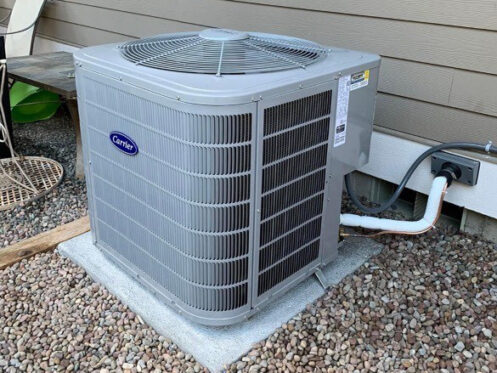HVAC systems are typically the most expensive equipment in your home. The health of these vital systems will have a direct impact on your climate control, air quality and more. To make the most of your furnace and air conditioner, it’s important to know what influences can impact their overall life spans. Learning more about your HVAC systems will help you save money and prevent expensive, premature replacements.
Average HVAC System Life Span
The majority of HVAC systems used in residential properties will last between 15 and 30 years. This estimate can vary depending on a variety of factors, like the type of HVAC system, your general care schedule and your monthly usage. Furnaces often last around two decades. Oil-based furnaces can heat your home for up to 30 years while gas heating systems may only last 20 years. This is because oil systems don’t produce as much damaging condensation.
Central air conditioners often have life spans of around 15 to 20 years. They don’t typically last as long as heating systems because of their outdoor components, which have to endure constant seasonal changes and direct sunlight. Heat pumps have similar life spans to air conditioners and may only last between 10 and 15 years. In addition to having an outdoor unit, these systems are also used year-round. An HVAC system’s life span is significantly impacted by its average usage.
Boilers are another common home HVAC system with average life expectancies of about 20 to 30 years. Older cast-iron boilers may provide reliable heating for several decades. On the other hand, modern options may last up to 20 years. It’s important to note that even if you have an older, long-lasting system, its efficiency likely can’t compete with that of a newer model.
Common Influences on Your System’s Life Span
In addition to the type of HVAC system you use, you should consider your preventative care schedule. A lack of care over the years could ultimately result in a premature breakdown. All heating and cooling systems require annual professional maintenance. This service keeps your system clean and prevents major issues from developing. It’s essential to leave your HVAC services and installations to certified professionals. Working with an experienced expert guarantees your system meets all local building and safety requirements.
It’s helpful to keep in mind your HVAC system’s brand. Higher-quality systems that boast better parts are more likely to last longer. While they may initially cost more, you won’t have to worry about frequent repairs or a shorter life expectancy. Don’t forget to factor in the impact of your local environment on your HVAC system. For example, if you live close to an ocean, the salty air can quickly corrode your equipment’s vital parts. Dry or dusty climates may increase the accumulation of damaging debris.
Your HVAC system’s life span is also affected by its size. Using a system that’s too big for the home’s square footage can result in short cycling, which creates excessive stress. Undersized systems won’t be able to efficiently meet your thermostat settings, meaning they’ll have to run for much longer. You need an HVAC system that’s professionally sized for your home.
The quality of your insulation can influence how much warm air escapes. This will affect how often your HVAC system turns on during the day. Remembering these factors can help you optimize your home for more energy-efficient heating and cooling.
Signs You Need an HVAC Replacement
Your HVAC system could be nearing the end of its life if you’re regularly calling for repairs. While you may infrequently need service during the peak seasons, you shouldn’t require repairs multiple times a year. These costs can quickly accumulate into thousands of dollars. Failing systems also tend to boost your energy costs. They become less efficient as they age, meaning they consume more energy while producing the same or potentially less climate control. Replacing the system would lower your service and utility costs.
Watch out for fluctuations in your home’s temperature control or air quality. Your family may begin finding hot and cold spots or rooms with uneven temperatures. A malfunctioning system can grapple with dust buildup and mold and mildew issues. These problems will quickly spread to your ductwork, impacting your home’s cleanliness and health.
It could be time to consider a replacement if you’re using a system that requires fossil fuels or harmful freon. Natural gas and oil aren’t environmentally friendly. Switching to an electric heat pump or another cleaner option would lower your carbon footprint and bills. You’ll also want to consider the chemicals used in your air conditioner. Systems installed before 2010 still had R-22 freon. In recent years, this refrigerant has been banned due to its negative impact on the environment. New air conditioners are safer for your home and family.
Tips to Maintain Your System’s Good Health
You can extend your system’s life span by routinely switching out your air filters. A clogged filter is one of the most common causes of HVAC issues like overheating and short cycling. You should replace most air filters every 30 to 90 days. This can fluctuate based on your household size, air quality needs, and filter type. Choose filters with higher Minimum Efficiency Reporting Value (MERV) ratings to limit how much debris enters your system.
Protect your outdoor units by frequently checking for nearby debris or encroaching shrubbery. You should keep a few feet of clearance around your HVAC system. Removing leaves and twigs will prevent them from blocking your air conditioner system. Don’t forget to check your systems for leaks, visible surface damage or signs of rust. Catching problems early will stop them from spreading and causing more harm.
You’ll also want to schedule annual HVAC care with a professional. Preventative service is the most effective way to lengthen your system’s life span. Just because you don’t yet notice any HVAC concerns doesn’t mean there isn’t an issue slowly worsening out of sight. An experienced technician has the tools and training to keep your system at optimum health and efficiency. You’ll enjoy years of low energy costs and superior heating and cooling.
A professional will also be able to offer recommendations on filters, indoor air quality solutions and insulation improvements. They can show you how to avoid overworking or straining your system over the years. Additionally, for most manufacturer warranties, yearly maintenance is a requirement. Prematurely losing this warranty could leave you responsible for all future system defects or covered part replacements. Preventative tune-ups are a valuable investment in your family’s comfort and your HVAC system’s security.
Your Family-owned HVAC Company
Since 1965, Marr's Heating and Air Conditioning has been dedicated to delivering a superior customer service experience in Bellingham, WA. We understand how important your HVAC system is to your family’s quality of life. That’s why we strive to provide exceptional repairs, tune-ups and installations. We’re always transparent about our prices and services. Our family-owned business can help you with your air quality, ductwork or a new fireplace. We also offer service specials and financing on approved credit for installations. Be sure to think of us if you’re ever in need of 24/7 emergency repairs. Call Marr's Heating and Air Conditioning today to learn more about our premier HVAC installation services in Bellingham, WA.

